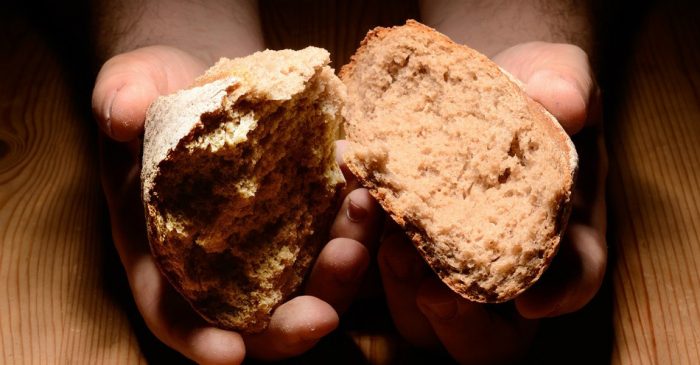Fr Paolo Consonni, MCCJ
18th Sunday Ordinary Time Year B
Gospel Reflection
“Do not work for the food that perishes, but for the food that endures for eternal life, which the Son of Man will give you […] For the bread of God is that whichcomes down from heaven and gives life to the world […] I am the bread of life…” (Jn 6:27, 33, 35)
The above sentence from this Sunday’s Gospel (Jn 6:24-35) reminds me of Jesus’ reply to the Tempter during His 40-day retreat in the desert: “One does not live by bread alone” (Lk 4:4 and Mt 4:4). Food is one of the most basic necessities. Yet it is not enough to give life meaning and purpose. Are the two, the food we need to earn through our work, and the one “the Son of Man will give you” in contrast with each other?
You might be familiar with the theory of the pyramid of needs developed by Abraham Maslow in the past decades. It says that human needs form a hierarchical structure, with basic physiological needs (like food and shelter) at the base, followed by safety, love, belonging, and esteem. At the top of the pyramid there is the need for self-actualization.
Most of us oversimplify the theory by concluding that, if the most basic set of needs are not met, then a person cannot dedicate oneself to the pursuit of higher needs, but this is not true. Progression from one stage of the pyramid to the next is not necessarily linear. Many students are pursuing their dream of learning sacrificing food and sleep in the process. Many saints followed their vocation without focusing on the satisfaction of their basic needs. Many volunteers working in dangerous areas risk their lives for the good of others, even at the cost of their own safety.
Also, contrary to another common misconception about Maslow’s theory, self-actualization doesn’t automatically follow the fulfillment of more basic needs. Some people, after having achieved wealth and comfort through hard work, still experience inner emptiness. Conversely, through faith, some impoverished or sick people might find meaning and purpose in life despite daily struggles and pain.
Let us go back to the Gospel. First of all, Jesus’ invitation to “do not work for the food that perishes” does not mean that He considers it irrelevant. As we have read last Sunday, Jesus deeply cared about the physical hunger of the thousands of people coming to listen to Him and multiplied bread and fish. During the Exodus, God sent manna for forty years to the starving people of Israel wandering in the desert because He was concerned about their wellbeing. As instructed by Jesus, in the Our Father, we invoke Him to “give us this day our daily bread”.
Yet, Jesus clearly understood the danger of people approaching Him only to obtain material benefit and, to use more modern terminology, to constrain God’s role in our life into the limited framework of Marlow’s pyramid of needs. How often do we approach God only for social, political, economic, and cultural reasons, or to ensure our security and health? This approach is understandable (we do have human needs!) but it is not transformative. It only brings God within the horizon of our needs more than inserting us into the life of the Trinity as sons and daughters of God.
We stand in need of transcendence, namely, to give meaning to our concrete actions and concerns and to connect them to God’s Kingdom. Towards the end of his career, even Maslow realized the hierarchy he proposed was incomplete. Self-actualization wasn’t the pinnacle of his pyramid — self-transcendence was. We need something beyond our “self” to give meaning and purpose to our human experiences. This is the “Bread of Life” Jesus came to offer us.
In conclusion, on one hand, we should not over-emphasize the importance of our needs (someone defines this as “the tyranny of needs”) and, at the same time, not overlook them because they are part of our experience, and therefore of our relationship with God. In other words, we should not use a dualistic mindset to approach the question of whether the food we earn through our work is in contrast with the Bread of Life given by Jesus. Both are important, and both must lead to God: in the search for material food, we concentrate more on His gift; in the search for spiritual food, we concentrate more on the Giver.
The Eucharist harmonizes both aspects of our question in a non-dualistic way. We bring to the altar “the work of our hands”, the bread that perishes. Once offered, blessed, broken and shared, that same food becomes the Sacrament of the Body of Christ, the “Bread of Life” that sustains our journey towards eternity. In the Eucharistic, the two breads are not in contrast but in union. By receiving the Eucharist, we are invited to integrate the material and spiritual aspects of our life too.


 Follow
Follow


